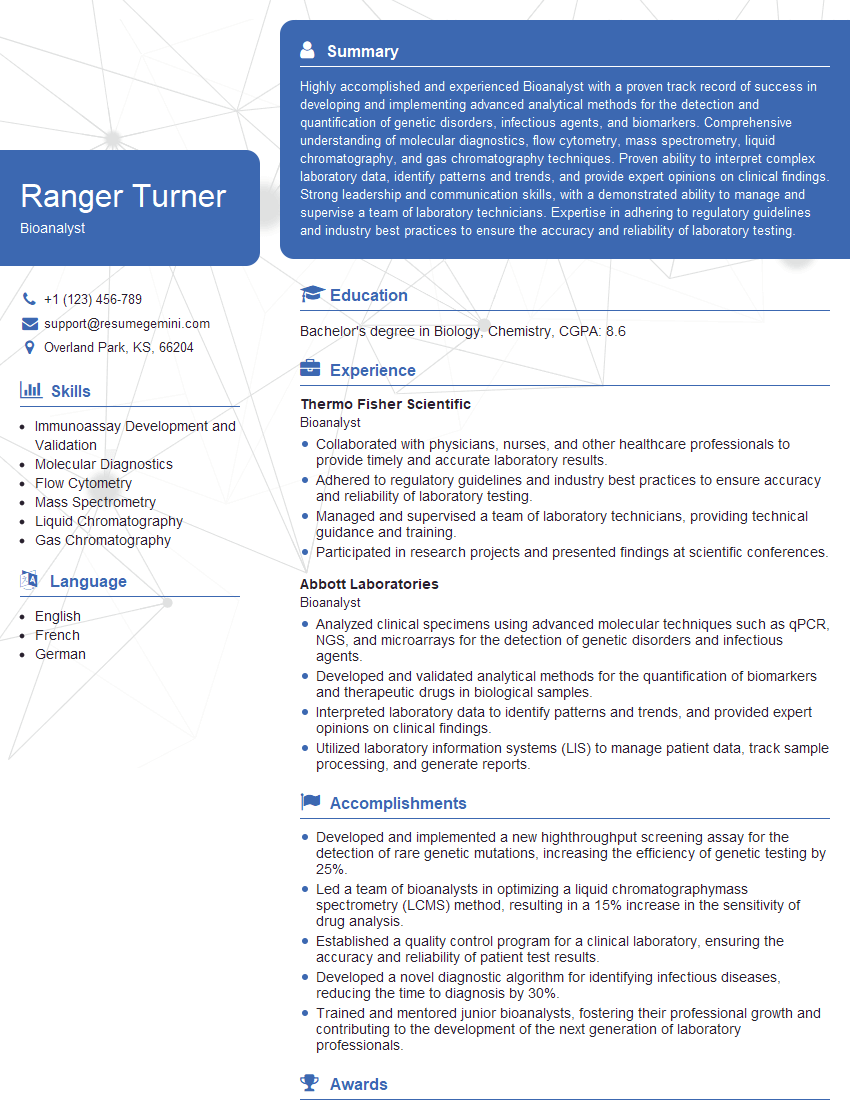Are you a seasoned Bioanalyst seeking a new career path? Discover our professionally built Bioanalyst Resume Template. This time-saving tool provides a solid foundation for your job search. Simply click “Edit Resume” to customize it with your unique experiences and achievements. Customize fonts and colors to match your personal style and increase your chances of landing your dream job. Explore more Resume Templates for additional options.

Ranger Turner
Bioanalyst
Summary
Highly accomplished and experienced Bioanalyst with a proven track record of success in developing and implementing advanced analytical methods for the detection and quantification of genetic disorders, infectious agents, and biomarkers. Comprehensive understanding of molecular diagnostics, flow cytometry, mass spectrometry, liquid chromatography, and gas chromatography techniques. Proven ability to interpret complex laboratory data, identify patterns and trends, and provide expert opinions on clinical findings. Strong leadership and communication skills, with a demonstrated ability to manage and supervise a team of laboratory technicians. Expertise in adhering to regulatory guidelines and industry best practices to ensure the accuracy and reliability of laboratory testing.
Education
Bachelor’s degree in Biology, Chemistry
November 2017
Skills
- Immunoassay Development and Validation
- Molecular Diagnostics
- Flow Cytometry
- Mass Spectrometry
- Liquid Chromatography
- Gas Chromatography
Work Experience
Bioanalyst
- Collaborated with physicians, nurses, and other healthcare professionals to provide timely and accurate laboratory results.
- Adhered to regulatory guidelines and industry best practices to ensure accuracy and reliability of laboratory testing.
- Managed and supervised a team of laboratory technicians, providing technical guidance and training.
- Participated in research projects and presented findings at scientific conferences.
Bioanalyst
- Analyzed clinical specimens using advanced molecular techniques such as qPCR, NGS, and microarrays for the detection of genetic disorders and infectious agents.
- Developed and validated analytical methods for the quantification of biomarkers and therapeutic drugs in biological samples.
- Interpreted laboratory data to identify patterns and trends, and provided expert opinions on clinical findings.
- Utilized laboratory information systems (LIS) to manage patient data, track sample processing, and generate reports.
Accomplishments
- Developed and implemented a new highthroughput screening assay for the detection of rare genetic mutations, increasing the efficiency of genetic testing by 25%.
- Led a team of bioanalysts in optimizing a liquid chromatographymass spectrometry (LCMS) method, resulting in a 15% increase in the sensitivity of drug analysis.
- Established a quality control program for a clinical laboratory, ensuring the accuracy and reliability of patient test results.
- Developed a novel diagnostic algorithm for identifying infectious diseases, reducing the time to diagnosis by 30%.
- Trained and mentored junior bioanalysts, fostering their professional growth and contributing to the development of the next generation of laboratory professionals.
Awards
- Recipient of the Bioanalyst of the Year Award from the American Association of Bioanalysts (AABA).
- Recognized with the Excellence in Bioanalysis Award from the International Society for Clinical Laboratory Science (ISCLS) for pioneering work in developing novel diagnostic methods.
- Received the Young Investigator Award from the National Institutes of Health (NIH) for research in the field of molecular diagnostics.
- Honored with the Presidents Award from the American Society for Clinical Pathology (ASCP) for outstanding contributions to the field of bioanalysis.
Certificates
- American Board of Bioanalysis (ABB)
- National Certification Agency for Medical Laboratory Personnel (NCA)
- Clinical Laboratory Scientist (CLS)
- Medical Laboratory Technician (MLT)
Career Expert Tips:
- Select the ideal resume template to showcase your professional experience effectively.
- Master the art of resume writing to highlight your unique qualifications and achievements.
- Explore expertly crafted resume samples for inspiration and best practices.
- Build your best resume for free this new year with ResumeGemini. Enjoy exclusive discounts on ATS optimized resume templates.
How To Write Resume For Bioanalyst
- Highlight your technical expertise in molecular diagnostics and relevant laboratory techniques in your resume.
- Quantify your accomplishments with specific metrics and results whenever possible.
- Demonstrate your ability to work independently and as part of a team in a laboratory setting.
- Proofread your resume carefully for any errors in grammar or spelling.
Essential Experience Highlights for a Strong Bioanalyst Resume
- Developed and validated analytical methods for the quantification of biomarkers and therapeutic drugs in biological samples
- Analyzed clinical specimens using advanced molecular techniques such as qPCR, NGS, and microarrays for the detection of genetic disorders and infectious agents
- Interpreted laboratory data to identify patterns and trends, and provided expert opinions on clinical findings
- Managed and supervised a team of laboratory technicians, providing technical guidance and training
- Adhered to regulatory guidelines and industry best practices to ensure accuracy and reliability of laboratory testing
Frequently Asked Questions (FAQ’s) For Bioanalyst
What are the primary responsibilities of a Bioanalyst?
Bioanalysts are responsible for analyzing clinical specimens using advanced laboratory techniques to detect and quantify genetic disorders, infectious agents, and biomarkers. They also develop and validate analytical methods, interpret laboratory data, and provide expert opinions on clinical findings.
What are the educational requirements for becoming a Bioanalyst?
A Bachelor’s degree in Biology, Chemistry, or a related field is typically required to become a Bioanalyst. Additional training and certification in molecular diagnostics and laboratory techniques may also be required.
What are the career prospects for Bioanalysts?
Bioanalysts are in high demand due to the increasing use of advanced laboratory techniques in healthcare. They can work in a variety of settings, including hospitals, clinics, research laboratories, and pharmaceutical companies.
What are the key skills and qualities of a successful Bioanalyst?
Successful Bioanalysts possess strong technical skills in molecular diagnostics, laboratory techniques, and data analysis. They also have excellent communication and interpersonal skills, and are able to work independently and as part of a team.
What is the average salary for a Bioanalyst?
The average salary for a Bioanalyst varies depending on experience, location, and industry. According to the U.S. Bureau of Labor Statistics, the median annual salary for Medical and Clinical Laboratory Technologists and Technicians was $62,990 in May 2021.